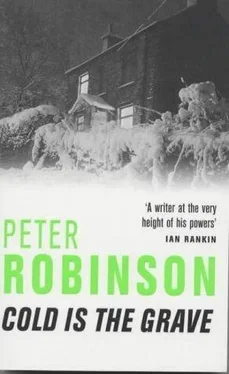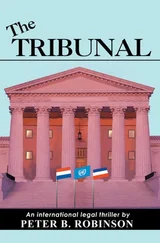Dr. Glendenning had confirmed Dr. Burns’s original determination that strychnine, mixed in a high ratio with pharmaceutical cocaine, had caused Emily’s death. Glendenning had performed the simple toxicology test for strychnine himself, dissolving some of the suspect crystals in sulfuric acid and touching the edge of the solution with a crystal of potassium chromate. It turned purple, then crimson, then all color faded. Proof positive. Further tox tests would be done at Wetherby, but for now, this was enough. So far, all the media knew was that she had died of a suspected drug overdose, but it wouldn’t be long before some bright spark of a reporter sniffed out the truth. Sometimes the press seemed even more resourceful than the police.
As it turned out, Emily’s neck wasn’t broken; she had died of asphyxiation. Other than the fact that she was dead, Glendenning had also told Banks, she was in extremely good health. The drugs and drink and cigarettes clearly hadn’t had time to take their toll on her.
The Old Mill stood at the end of a cul-de-sac, like Banks’s more humble abode, so the uniformed officers on guard could stand well over a hundred yards away, where it turned off from the main road, and keep reporters away without even being seen by the Riddles. Banks showed his warrant card and the officer on duty waved him through. Rosalind answered the door and led him through to the same room where he had given Riddle the news. She was dressed in black and her eyes looked dark with lack of sleep. Banks guessed that Riddle must have awoken her as soon as he had left last night. They wouldn’t have had any sleep since then.
“Banks.” Riddle got slowly to his feet when Banks entered the room. He was dressed in the same clothes he had been wearing last night, a little more the worse for wear. He looked haggard, and there was a listlessness and a defeated air about his movements that Banks had never seen him exhibit before. He had always been energetic and abrupt. Perhaps he had taken a tranquilizer, or perhaps this was the toll that recent events had taken on his system. Whichever it was, the man looked as if he could use a doctor as well as a good night’s sleep. “Any news?” he asked, without much hope in his voice.
“Nothing yet, I’m afraid.” Banks didn’t want to mention the postmortem, though he knew Riddle would be aware that it had been conducted. He only hoped the CC had enough common sense not to bring something like that up in front of his wife.
“Confirmed cause of death?” he asked.
“It’s what we thought.”
Rosalind put her hand to her throat. “Strychnine. I’ve read about that.”
Banks glanced at Riddle. “You’ve told her…?”
“Ros understands she’s to talk to no one about the cause of death. I don’t suppose it’ll be a secret for long, though?”
“I doubt it,” said Banks. “Not now the postmortem’s over. Glendenning’s sound as a bell, but there’s always someone there who lets the cat out of the bag. Mrs. Riddle,” he said, perching at the edge of his armchair, “I need to ask you some questions. I’ll try to make it as painless for you as possible.”
“I understand. Jerry explained it to me.”
“Good. Emily had been back from London about a month. During that time, had she given you any cause for concern?”
“No,” said Rosalind. “In fact, she’d been extremely well-behaved. For Emily.”
“Meaning?”
“Meaning, Chief Inspector, that if she wanted to stay out all night at a rave, she would. Emily always was a willful child, as I’m sure you’re aware, difficult to control. But I saw no evidence of drug use, and she was generally polite and good-natured in her dealings with me.”
“I gather that wasn’t always the case?”
“It was not.”
“Had she been out a lot since her return?”
“Not much. Last night was only the second or third time.”
“When was the last time?”
“The night before. Wednesday. She went to the pictures with some friends. That new cinema complex in Eastvale, and a week or so ago she went to a friend’s birthday party in Richmond. She was home shortly after midnight both times.”
“What did she do with her time?”
“Believe it or not, she stayed in and read a lot. Watched videos. She also made inquiries about getting into a sixth-form college. I think she was finally deciding to take life a bit more seriously.”
“Did she ever confide in you about any problems she might be having? Boys, or anything like that?”
“That wasn’t Emily’s way,” said Rosalind. “She was always secretive, even when she was little. She liked a sense of mystery.”
“What about boyfriends?”
“I don’t think there was anyone special. She hung around with a group of people.”
“It must have been difficult for her to make friends locally, with being off at school down south so much of the time.”
“It was. And you probably know yourself, the locals aren’t always that welcoming of southerners, even these days. But when she was home for the holidays she’d meet people. I don’t know. She didn’t seem to have any real trouble making friends. She was outgoing enough. And of course, she still knew people from when she was at Saint Mary’s School here. That was only two years ago.”
“What about Darren Hirst? Did she ever mention him?”
“Yes. In fact, it was his birthday party she went to last week. But he wasn’t her boyfriend; he was just part of the group she hung out with. The lad with the car. They came to the house to pick her up on Wednesday – Darren and a girl, Nina or Tina or something – and they certainly seemed pleasant enough, although I didn’t approve of her hanging around with people who were, for the most part, three or four years older than she was. I knew she went to pubs and could get served easily enough, and I didn’t like it. I told her often enough, but she just accused me of going on at her, and in the end I gave up.”
“Did she ever mention someone called Andrew Handley?”
“No.”
“Andy Pandy?”
“Is this some sort of joke? Who’s he?”
“It’s not a joke. That’s his nickname. He’s a colleague of the man Emily was living with in London.”
“Never heard of him,” said Rosalind. She reached forward, grabbed a tissue from the box on the table and sniffled into it. “I’m sorry,” she mumbled. “Please excuse me.”
Riddle moved over to her and touched her shoulder hesitantly, without much warmth, it seemed. In response, Rosalind’s body stiffened, and she turned away. Banks thought he glimpsed something in her eyes as she turned – fear or confusion, perhaps. Did she suspect her husband of being involved in Emily’s death? Or was he protecting her? Whatever it was, there was something desperately out of kilter with the Riddle family.
“Did Emily speak to you of her plans for the future, Mrs. Riddle?” Banks asked, switching the direction of the interview to something he thought might be a little easier for her to deal with.
“Only that she wanted to do her A-Levels and go to university,” said Rosalind, still dabbing her eyes with the tissue. “Preferably in America. I think she wanted to get as far away from here and from us as she could.”
Out of sight, out of mind, thought Banks. And less likely to damage Riddle’s fledgling political career, if that wasn’t already damaged beyond repair. He remembered on his first visit, when the Riddles asked him to go to London and find Emily, how he had got the impression that Rosalind hadn’t particularly wanted her to come back home. He got the same impression now. “And you approved?”
“Of course I did. It’s better than her running off to London and living with some… I don’t know… some drug dealer.”
Читать дальше












